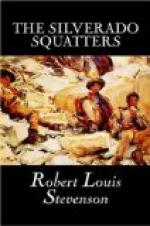And presently the city-tide was at its flood and began to ebb. Life runs in Piccadilly Circus, say, from nine to one, and then, there also, ebbs into the small hours of the echoing policeman and the lamps and stars. But the Toll House is far up stream, and near its rural springs; the bubble of the tide but touches it. Before you had yet grasped your pleasure, the horses were put to, the loud whips volleyed, and the tide was gone. North and south had the two stages vanished, the towering dust subsided in the woods; but there was still an interval before the flush had fallen on your cheeks, before the ear became once more contented with the silence, or the seven sleepers of the Toll House dozed back to their accustomed corners. Yet a little, and the ostler would swing round the great barrier across the road; and in the golden evening, that dreamy inn begin to trim its lamps and spread the board for supper.
As I recall the place—the green dell below; the spires of pine; the sun-warm, scented air; that gray, gabled inn, with its faint stirrings of life amid the slumber of the mountains—I slowly awake to a sense of admiration, gratitude, and almost love. A fine place, after all, for a wasted life to doze away in—the cuckoo clock hooting of its far home country; the croquet mallets, eloquent of English lawns; the stages daily bringing news of—the turbulent world away below there; and perhaps once in the summer, a salt fog pouring overhead with its tale of the Pacific.




